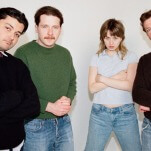Josh Ritter’s Kinetic Energy
“I had in my head it was going to be exuberant,” says songwriter Josh Ritter.
For his eighth album, one of Paste’s 100 Greatest Songwriters had a roadmap before he started writing songs, ready to follow 2013’s The Beast in Its Tracks with his most rocking, rollicking record yet.
“That’s what I was going for the whole time, a feeling of great kinetic energy. I saw it in my head as much as I saw the songs, just a Technicolor, red-blooded record,” he says. “I really feel like I caught a big fish on this one.”
A songwriter who has been at it for nearly two decades, Ritter says he’s gotten to know his style and his way of thinking so well that his output had almost become a foregone conclusion. So for Sermon on the Rocks, he reached for a new vibe, working in unfamiliar ways to create a different result.
“Once you do it for a while it can be a bit boring,” he says. “You know what you’re going to write beforehand. I just cared less what my voice was telling me to do. It felt like a rebellion against myself. If a song came out and it was really weird, I just had to tell myself to go to hell and finish it.”
The Beast in Its Tracks was an album Ritter put together after his divorce, not necessarily about the heartache but about moving on, and as much as he needed to write those songs, he needed to move away and into a new realm for Sermon on the Rocks.
“I wanted it to be wild. I was feeling pretty wild,” he says. “I was up there in Woodstock, with a lot of free time and a real desire to do something fun and weird. I had this pent-up energy, and writing is a good way to get rid of that. I was ready to make this album more individually mine.”
Two songs came early in the process and helped point Ritter in his new direction.
“Seeing Me ‘Round” came together with a darker sound as Ritter began experimenting with more in-depth early demos and self-production. “I like the spooky vibe of it, that gave me one of the strands that goes through the record, that weird messianic vibe that I liked,” he says.
“Henrietta, Indiana” gave Ritter a place to write about, a small-town world to explore with typically rich characters and situations that force people to the edge. The narrative in “Henrietta, Indiana” brings together suffering and hard choices, the consequences heavy on either side.
“I’ve been through some rough factory towns where you feel like everybody’s just trying to hold on,” Ritter says. “All that has to happen is the factory closing down and a girl sees father turn bad, turns to alcohol to get help and medicate. It all just seems realistic to me.”
-

-

-

-

-

-

-

-

-

-

-

-

-

-

-

-

-

-

-

-

-

-

-

-

-

-

-

-

-

-

-

-

-

-

-

-

-

-

-

-








































